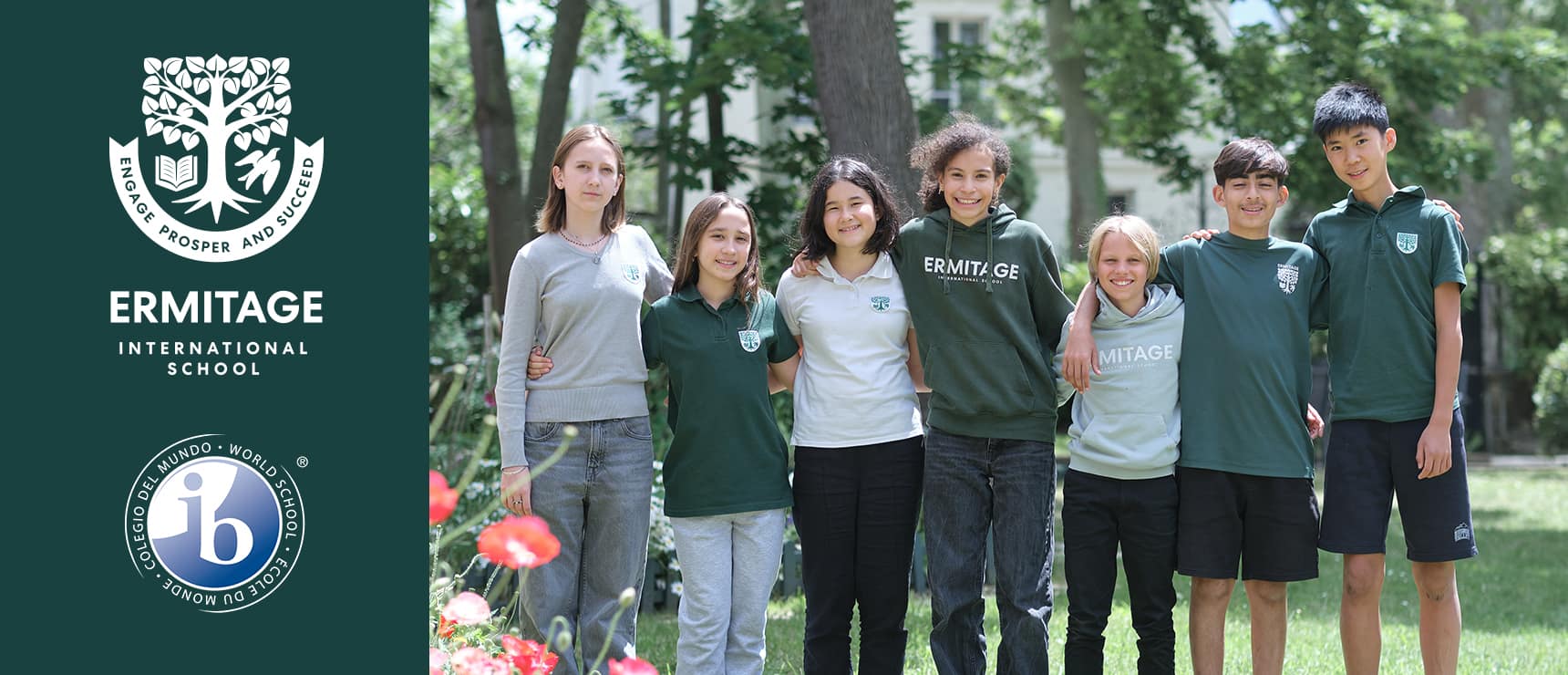What is the International Baccalaureate? With a focus on academic excellence, a global mindset, and future-ready learning, the International Baccalaureate prepares learners to thrive in a world of endless opportunities *****
Developed in the aftermath of the Second World War, in Geneva, the International Baccalaureate (IB), was created to provide an engaging and effective school programme to cater for the needs of families living and working around the world, in an international environment. In today’s interconnected world, the International Baccalaureate programme is more relevant than ever. At Ermitage International School, we offer this IB programme through the Middle Years Programme (MYP) and Diploma Programme (DP), for students aged 11-18. Why do we believe that this is such an outstanding programme, and why might this be right for your child?
The IB philosophy and frameworks provide so many benefits and opportunities, as a holistic, child-centred, internationally-minded approach. This enables each child to grow and succeed as doors are opened for the future, whilst providing a learning journey that is inspiring, rigorous, and possibly most importantly, enjoyable. This is vital! So many of the students who I have had the honour of supervising over my years as an educator, have shared that they found their first year of university a breeze, given the incredible academic and social preparation they received via having had an IB education.
We know that International Baccalaureate programmes provide a broad range of subjects, with students from MYP learning Language and Literature, Language Acquisition, Maths Integrated Sciences, Individuals and Societies, Arts and Design. Unlike many other systems, this breadth continues until the final years of school in the DP, with students continuing 6 subjects, and further reinforced by the ‘Core’, composed of an Extended Essay research, Theory of Knowledge, and CAS (Creativity, Activity, Service).
IB programmes also have the huge advantage for families navigating an international lifestyle, that it can be accessed from any age, by students who may have previously learnt in a national system, or who may later transition to a different one. It is conceptual and it focuses on skills and mindset within an international context, rather than the narrow learning of a specific set of information.
Today we also know that an IB education and the obtention of a Diploma, with even the possibility of a Bilingual Diploma, is highly sought after by employers and higher education providers. Indeed, universities worldwide now rate the IB higher than a number of established school systems, and students with a Diploma have an incredible choice of institutions and courses worldwide.
As we all consider our past, question the present, and as parents especially, wonder but also worry about the future, it is more essential than ever that the education of our children must enable them to learn so much more than information. Ultimately, what they need is a safe and engaging environment in which they can develop as the very best human beings they can be; with the human skills and mindset that will enable them to be independent and adaptable as they navigate the challenges and opportunities of our ever-changing world.
Let’s look at some of the key features of the IB, and in particular, how it develops independent and adaptable learners. Here are five key ways the IB Programme in international schools makes the “The IB Difference” by developing these essential qualities: 1. Focus on Inquiry-Based Learning The IB’s inquiry-driven approach encourages students to ask questions, explore concepts, and take ownership of their learning. For example, in the subject of ‘Design’ that we offer at Ermitage International School, students have a real-life task in which they have to design an office space for a client, taking through the activity from initial thoughts to final design.
Learning in this way gives meaning to the learning, makes it real, and ultimately makes the learning ‘stick. The strength here lies in this kind of learning enabling students to continue making connections and transferring learning in future situations. Ultimately, is this not what all learning should be about? Learning with this approach also has the huge benefit of developing critical thinking and the ability to independently navigate complex problems in a variety of contexts—skills that are crucial for our young adults as they prepare for tomorrow’s world. In a future where careers, technology, and societal challenges will continue to evolve at an unprecedented pace, the ability to think critically, adapt to new situations, and solve problems independently empower students to succeed in diverse and uncertain environments.
These skills equip them to become proactive, informed decision-makers, capable of addressing global challenges and contributing meaningfully to their communities. These thinking skills are crucial not only for the future but also in our children’s lives right now as teenagers. Critical thinking helps them evaluate the reliability of information they encounter online, discern credible sources from misinformation, and make thoughtful choices about what to share on social media. More than ever, our children need to understand this. These are the new and real challenges they and we face.
Learning to think critically also empowers our growing adolescents to navigate peer pressure, manage time effectively amidst competing priorities, and approach complex social and ethical issues with confidence and maturity. These skills are essential as they learn to take responsibility for their actions and decisions in a rapidly changing world. 2. Interdisciplinary Framework As well as the broad range of subjects the International Baccalaureate provides, the MYP and DP programmes emphasise connections between subjects, encouraging students to see real-world applications of their knowledge. This approach not only makes learning more meaningful and enjoyable but also allows students to explore topics they are passionate about, sparking curiosity and a deeper engagement with their studies.
Projects in which students work independently, such as the MYP Personal Project and the DP Extended Essay, provide opportunities for students to synthesise learning across subjects, apply this to real life problems, and form strong human connections through teamwork and shared exploration. It is incredible what a range of projects and essay titles learners are able to do, providing strong foundations for university research and project work, and inspiring them to develop their own interests.
By learning to research, synthesise, and apply knowledge across disciplines, they build the critical thinking and independent study skills essential for success at university, where self-directed learning and interdisciplinary approaches are key. This foundation helps them become effective earners and thoughtful, engaged citizens in an interconnected world. 3. Global Perspectives and International-Mindedness The International Baccalaureate curriculum nurtures an awareness of cultural diversity and global issues. For children who have lived in multiple countries, may not reside in the place where they were born, or have parents from different cultural backgrounds, this focus on international-mindedness is particularly important. These students, as is so typical of the incredible diversity of students we have at Ermitage International School with more than 80 nationalities and over 30 languages, often navigate a blend of identities and need the skills to embrace diversity, understand differing perspectives, and bridge cultural divides. By fostering adaptability, empathy, and a deep respect for others, the IB equips them to thrive in diverse communities and complex global settings.
In practical terms, international-mindedness prepares students for careers where cross-cultural communication is vital, such as diplomacy, international business, global health, or humanitarian work. It also supports success in life situations like studying abroad, building multicultural teams, or working on global environmental or social initiatives. Beyond individual success, international-mindedness opens up the door for mutual understanding, reduces prejudice, and creates pathways for collaboration. I am always blown away by observing how students from all over the world in our international schools find the common elements that make them human, providing hope that through them, we may build a more inclusive, harmonious and peaceful world. 4. Skills for Lifelong Learning The IB develops key competencies such as time management, self-regulation, and resilience, which are essential at every stage of a student’s academic and professional journey. The International Baccalaureate Learner Profile, is a set of attributes around which all learning experiences, including those of the teachers in the school, are framed. These can even extend to parents and the wider communities, as schools establish these as the foundation of their schools.
As “thinkers,” students are trained to critically evaluate challenges, develop structured solutions, and prioritise effectively—skills that are crucial when preparing for exams or whichever tests of life they are faced with. They learn to create efficient study schedules, balance their workload, and stay focused under pressure. Resilience enables them to cope with setbacks, such as a difficult test or a fallout with a friend, and to view these moments as opportunities to grow and improve.
When transitioning to university, these attributes become even more vital. As “inquirers,” students are encouraged to embrace curiosity and actively seek out knowledge, enabling them to adapt to the self-directed learning environments common in higher education. Time management and self-regulation allow them to balance academic demands with extracurricular pursuits and social responsibilities. Reflective practices, a key aspect of the DP’s CAS (Creativity, Activity, Service) which is one of the three elements of the DP Core, help them assess their progress and refine their approach, ensuring continuous personal and academic improvement. These competencies, grounded in the International Baccalaureate Learner Profile, prepare students to excel as adaptable, thoughtful, and ethical contributors in an ever-changing world. 5. Holistic Education Beyond academics, the IB emphasises personal and social development through service learning, leadership opportunities, and experiential activities. At Ermitage International school, for example, we have a Student Committees programme, where every student chooses a committee, whose aim is to contribute positively to school life or to the community, with the group itself being led by our DP senior students. Students are initiating a system of waste disposal, are developing a student newsletter, are forging links with local charities, and deliver their own assemblies as a platform for communicating about and celebrating their achievements. This comprehensive approach helps students adapt to varied roles and responsibilities in life, equipping them to thrive in dynamic global settings.
Every day, we see evidence that a holistic education is crucial as it nurtures a child’s emotional and social well-being, making them feel secure and valued. When students find genuine enjoyment in their school experience, they engage more deeply with their learning. They take the lead for their learning. This enjoyment builds a positive attitude towards education, leading to better academic outcomes as well as all round success.
As students grow in an environment that celebrates their individuality and encourages personal growth, they develop into happy and secure adults. These individuals are more likely to contribute positively to any community they become a part of, carrying forward values of empathy, collaboration, and innovation.
These features collectively make the International Baccalaureate an outstanding choice for cultivating independent, adaptable learners prepared for the challenges of the 21st century. The IB programme stands as a powerful educational framework that nurtures a well-rounded development in students. By equipping them with critical thinking skills, cross-cultural understanding, and a passion for learning, they are prepared to face the future with the human skills which give them independence and adaptability. Choosing the IB at Ermitage International School is an investment in your child’s future, opening doors to endless possibilities and lifelong success.
We welcome you to contact our admissions team to learn more about how the IB programme at Ermitage International School can provide your child with a strong foundation for a successful and a fulfilling future.
Marta Essinki, is the Head of School at Ermitage IB School. She has over twenty years’ experience as an educator, with expertise in language learning, and a commitment to holistic education that enables every child to grow, thrive and succeed.
Ermitage International IB School welcomes students aged 8-18, for our International Primary Programme, IB Middle Years Programme (MYP) and Diloma Programme (DP). The school is based in the small, leafy town of Maisons-Laffitte, just twenty minutes form the centre of Paris.

